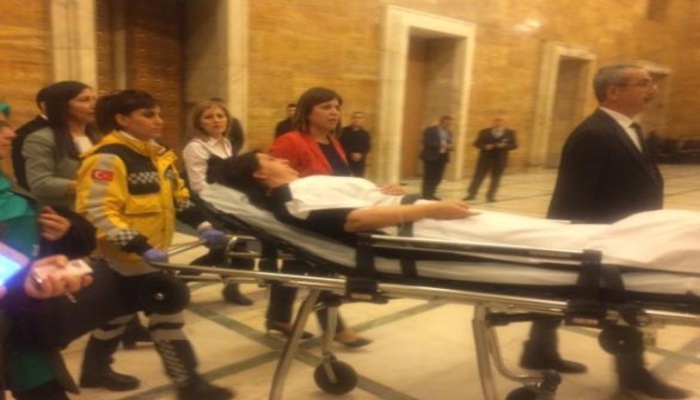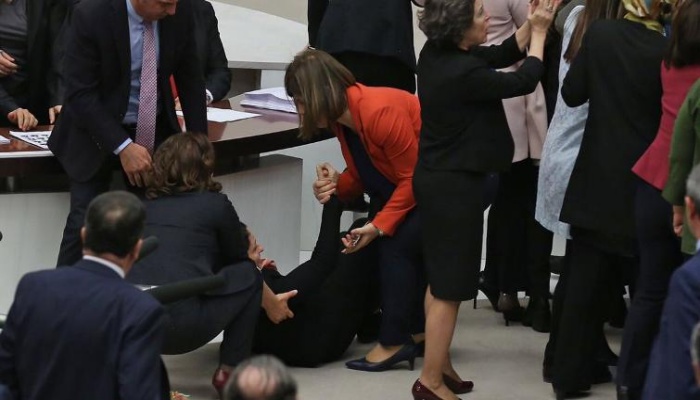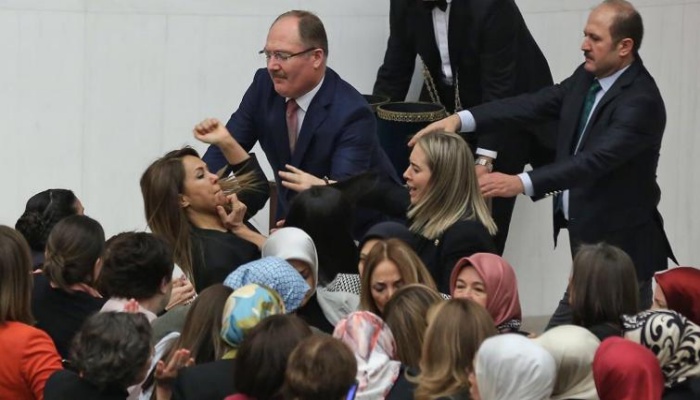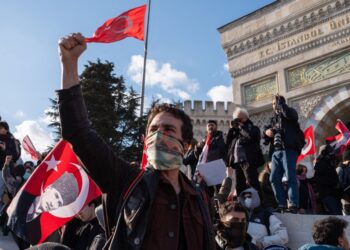Turkish Parliament relapsed into a rare moment of shame unseen before, when female lawmakers from the ruling Justice and Development Party (AKP) and opposition parties engaged in a brawl that hospitalized two of them, wounding four in total, after an independent legislator attached herself into the speaker’s podium to protest the constitutional reform bill.
As the ruling party, with the backing of nationalist opposition party, come closer to pass the bill in the second round, intense debates devolved into brawls, fights among rival lawmakers. Last week, more than a dozen of deputies involved in a fight that slightly wounded lawmakers.
But Thursday’s session set a new precedent in history of Parliament fights, as female legislators took the stage and exchanged roles with their male fellows. All the squabble broke out when independent lawmaker Aylin Nazliaka handcuffed herself into rostrum where deputies deliver speeches in the Parliament.
Other lawmakers strived for two hours to persuade Nazliaka to end her protest while acting Parliament speaker called twice for breaks to the session. When their efforts failed to yield a result, female legislators from the ruling AKP this time forcefully tried to remove her from rostrum.

That sparked a fight between opposition and the AKP legislators. Pervin Buldan from Kurdish opposition People’s Democracy Party (HDP) was hospitalized after being kicked by an AKP lawmaker, reportedly Gokcen Enc, in the chest. Disabled CHP deputy Safak Pavey also fell to the ground during the brawl and suffered tissue damage. She spent the night at a hospital due to seriousness of her injury.

After the recess, Parliament reconvened amid calls from opposition party for the removal of Enc from the session for her attack against Buldan. HDP legislators are blaming Enc for kicking Buldan, while the ruling AKP said Enc was also briefly hospitalized after receiving blows to her neck and back.
At a time when opposition parties feel crippled, Nazliaka displayed a different form of resistance and disobedience to protest the bill, which designates a strong executive presidency. Many critics, like Nazliaka, argue that the reform package amounts to a regime change, and republican democracy with its current shape will be condemned to dustbin of history.
Cut a rebel figure, Nazliaka who defied strict hierarchical codes within her former party CHP, came to spotlight on several occasions when she never hesitated to take a different path from the party line.
Last year, Nazliaka was expelled from the secular opposition CHP for allegedly removing poster of Mustafa Kemal Ataturk, Turkey’s founder, from her room. She was accused of abandoning Republicanism, a core ideological pillar of CHP and founding principle of the Republic. Today, it was her opposition in Parliament that epitomized the defense of the republic Ataturk envisioned.
She came up with an epic battle for the republican cause, and unsuccessfully tried to nudge leader of Nationalist Movement Party (MHP) Devlet Bahceli to renew his commitment to the Republic. MHP’s support is vital for ruling AKP to pass the bill through Parliament for a national referendum this spring.
Bahceli responded that he understood request of Nazliaka but did not appear to budge his position. In a separate remark, he implied that MHP supporters will launch a public campaign to persuade people to vote in favor of the bill in referendum.
To the dismay of opposition parties and some of its own constituency, Bahceli cut an alliance with President Recep Tayyip Erdogan and gave a once-in-lifetime chance to him to push forward with his lifelong bid.
To lure MHP leader, AKP appears with new overtures. New potential political deal lies at the core of MHP’s support to the ruling party which has 316 seats in Parliament, 14 short of 330 to pass a constitutional amendment package for referendum. Prime Minister Binali Yildirim said that in the new executive presidential system, some of the ministerial posts would be left to MHP legislators.
President may choose ministers from different parties, not just the party of majority in Parliament, paving way for possible appointment of MHP lawmakers as ministers.
Bahceli’s endorsement of Erdogan’s presidential bid represents an unprecedented turnaround both for him and his party after years of unwavering opposition to any shift to executive presidency, citing concerns of authoritarianism. Some critics believe that Bahceli owes his political career to Erdogan who helped him ward off intra-party challenge to his grip over the nationalist opposition.





















